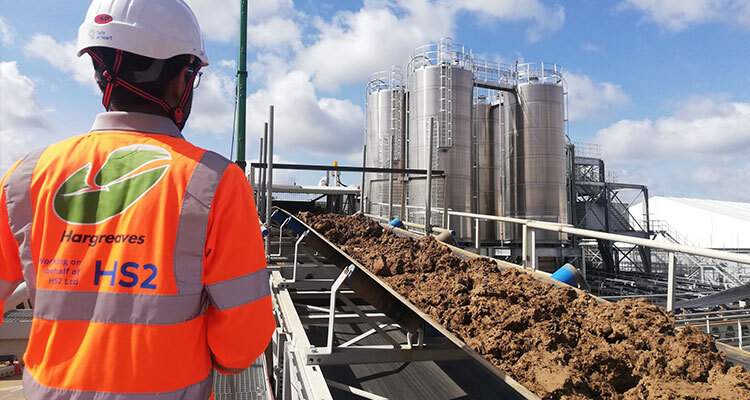
From coal to construction: follow Hargreaves Industrial Services’ inspiring journey
As one of the primary providers of industrial engineering and maintenance services in the UK, Hargreaves Industrial Services Ltd, a company within Hargreaves Services Group plc has garnered a strong reputation for excellence. The Hargreaves Group delivers environmental and industrial services across the UK, Southeast Asia, and South Africa, benefitting from its team’s invaluable international expertise. The company’s leadership extends beyond industrial services, as Hargreaves is a pioneer in land regeneration, as well as property and infrastructure development. Headquartered near Durham, the company boasts a dedicated team of over 1250 employees strategically positioned around the world, delivering a diverse range of projects and services to various industries. Sean Hager, Managing Director of Hargreaves Industrial Services, and Lucie McDermott, Proposals Director, delve into the company’s history.
“Hargreaves Industrial Services, a part of the Hargreaves Group, was born out of the coal mining industry,” Lucie begins. “It was a cradle to grave offer. At that time, as a publicly listed company, our operations revolved around mining coal, processing, handling, transporting, and selling coal. Hargreaves Industrial Services handled it on behalf of the coal fired power stations. That was our entire business model, which caused an issue as of course, coal mining declined and doesn’t really exist in the UK anymore. As a result, both as a group and as a division within the group, we underwent a quite substantial strategic shift to move away from coal-related activities. With all our skills and personnel working in a dying industry, it became imperative for us from a social value aspect, to protect and maintain a sustainable future for the company. Consequently, a lot of effort has gone into a complete change of direction, which has been taking place gradually over the past five-to-ten years. As we stand in 2024, we only have one remaining contract in the coal industry,” she states.
Diversification strategy
Shifting away from coal-related activities has reshaped Hargreaves Industrial Services’ modus operandi, empowering the company to leave its mark within the ever-fluctuating construction industry. As challenging as the industry is, Hargreaves has shown it has what it takes to thrive in the sector. “Our core expertise lies in materials handling. Initially centred around coal and power stations, we have morphed our materials handling skills into different sectors and materials. Services we now offer include conveying, crushing, screening, handling, stock management, and more. Whether it involves developing fixed handling solutions and installing them for specific projects or collaborating with clients on long-term contracts with mobile solutions, our focus remains on the comprehensive materials handling aspect. Recently though, we have transferred those skills to other areas. We have expanded into carrying out infrastructure works. As part of this diversification strategy, we bought S&B Utilities 18 months ago, a business operating within the water sector. Although this is a completely new sector for us, our approach, ethos, engineering, and management principles remain the same. I would say that our adaptability and flexibility enable us to thrive in the infrastructure sector. However, it is worth noting that we are not directly linked to construction projects, which enables us to navigate the fluctuations in the industry. Long-term contracts still account for approximately 80 per cent of our business, which provides us with stability,” informs Sean.
 Net-zero commitment
Net-zero commitment
Sean discusses Hargreaves’ contribution to the building of the High Speed 2 (HS2) railway line. “We became involved in the development of HS2 delivering a conveying solution on behalf of our sister company, Blackwell Earthmoving Ltd, where a significant amount of material needed to be transported. The challenge was that the material couldn’t be moved solely using conventional methods, such as dump trucks and loading shovels; alternative solutions were required. One of the problems we were faced with was that we needed to move materials to build a flyover over a railway, a truck road, and a country lane. This means that we would have had to put the material into trucks and move it via a 40-mile round trip.
To avoid that, we built a conveyor that could span all three, and cover the necessary distance from the starting point. One notable benefit of using the conveyor system was the absence of trucks on the road which not only improved safety, but also had environmental benefits since we didn’t need diesel-powered trucks,” he enlightens.
Maintaining sustainable and eco-friendly practices within the construction industry is no easy task, but Hargreaves makes great strides to positively impact communities as well as the environment. “Currently, we are actively working towards rolling out a group-wide net-zero commitment, which in our industry is challenging. Obviously, we operate a significant amount of plant and equipment that burns diesel, but we are exploring alternative energy sources and identifying opportunities to transition to more sustainable options. Moreover, our commitment to sustainability extends to the goods we purchase, as we strive to prioritise environmentally friendly options. Lastly, we ensure that we only use energy sourced from green providers in our office buildings. While being sustainable presents challenges due to the nature of our work, we are dedicated to making continuous progress in this area. Sustainability is an evolving journey, and despite the obstacles, we are doing our best to advance our sustainable practices. In terms of community engagement, we seek to create value by recruiting people in local areas, including those from disadvantaged backgrounds. Additionally, we aim to do more volunteering as a way to give back to the community. The group has also created a fund dedicated to supporting individuals and communities whether they are employees, their families, or children who require sponsorship for various endeavours,” ends Lucie.
With a journey marked by diversification efforts and significant sustainability initiatives, Hargreaves is poised for continued success in the infrastructure industry.